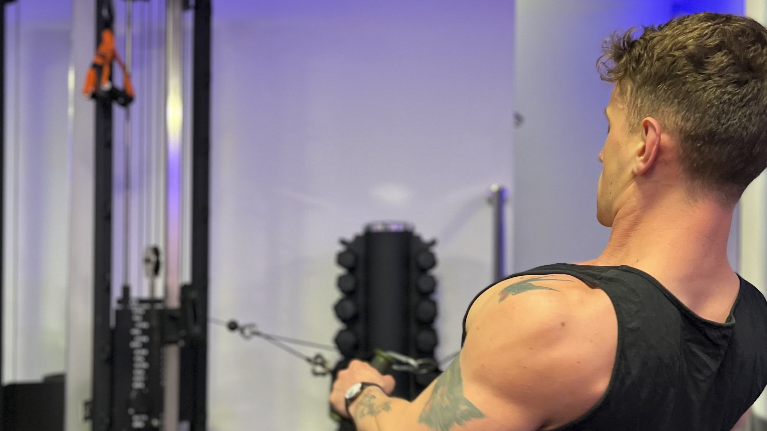On the surface, ‘losing weight’ – or rather, ‘losing bodyfat’ seems like it should be easy. There are plenty of social media ‘experts’ who just tell you that you need to be moving more and eating less. The trouble is, it’s not always a simple task in practice.
In this blog, we’ll look at why people don’t lose weight even if they think they’re taking the right steps.
Don’t worry if you’re one of these people – there are plenty of actionable points here that’ll help you reassess what you’re doing and help you move in the right direction.
Why am I not losing weight?

Losing weight is one of the most common health and fitness goals. While it may seem relatively straightforward, it’s not uncommon to come across roadblocks in your weight loss journey.
For long term, sustainable weight loss there are a number of factors to consider, the most important being:
- Nutrition
- Activity
- Sleep/Recovery
If you’re not ticking all of these boxes, chances are your weight loss goals will remain out of reach.
In the simplest terms, in order to lose weight you must be in a caloric deficit. That means you are consuming fewer calories than you are burning. If you burn more than you consume, your body will take the energy it needs from the reserves in your body, ideally from fat stores.
In order to achieve a caloric deficit, you can reduce the amount of energy you take in, increase the amount of energy you burn (through increasing your activity) or, ideally, do both.
Many people suffer weight loss setbacks due to not accurately tracking, or not tracking at all, the calories they consume. If you have no awareness of how much energy you’re taking in, or burning, it can be difficult to have any insight as to how to adjust your lifestyle to meet your goals.
When it comes to sleep, the relationship between it and weight loss is complex. However, multiple studies have shown that there is a positive relationship between adequate sleep and weight loss. While a lack of sleep has been shown to cause dysregulation of the hormones leptin, which signals that you feel full, and ghrelin, which promotes hunger, meaning poor sleep may lead to an increase in appetite.
While the contributing factors may vary, if you’re not losing weight it is ultimately down to energy balance.
Scenario 1: Dieting but not losing weight
‘Dieting’ is a subjective term. If your ‘diet’ involves being in a planned caloric deficit, you’re set up for success. If it just involves avoiding certain foods because you feel like they don’t fit in with a weight loss plan, your results may vary.

If you’re ‘dieting’ without tracking your calorie consumption, you’re going in blind. If this sounds like you, the first step is to accurately track how much you’re consuming. From there, you can adjust either your consumption or activity in order to achieve a caloric deficit.
You may be surprised to find out how much you’re consuming without realising. Often ‘healthy’ foods are very high in calories. Take for example nuts or avocados. There are tremendous health benefits to these foods, they’re incredibly nutritionally dense but they’re also high in calories. Therefore, if your diet consists of just swapping crisps for nuts, you might find yourself unintentionally undoing your caloric deficit.
You may also be failing to factor in certain calories. For example, many people often fall down when it comes to liquid calories. Failing to consider the calories your drink, as well as those you eat, could mean you’re undoing your hard work without realising.
Ultimately, if your diet is unsuccessful its due to you consuming more calories than you burn, or a medical issue. The only way to absolutely rule out the former, is to ensure you accurately track your calorie consumption.
Scenario 2: Dieting and exercising but not losing weight
As above, if you are dieting, exercising and leading what you would overall consider a ‘healthy lifestyle’ yet not seeing the weight loss results you expect, it may be due to you underestimating how much you’re consuming while overestimating how much you’re burning.
Overestimating the number of calories you burn is a common issue. In a hard hour of strength training, which may leave you feeling physically exhausted, it’s unlikely you’re burning more than a few hundred calories. This in and of itself isn’t a problem, but it becomes an issue if you overestimate the calorie deficit your workout has got you into. You could very easily undo that deficit with a post workout shake.

The type of exercise you opt for may also impact your results. It may seem counterintuitive, if you’re running yourself into the ground every day without adequate recovery, you may actually see some fat gain. This is usually due to an increase in your levels of cortisol, aka the stress hormone, which can lead to fat gain.
It’s also worth considering what we mean when we say ‘weight loss’ as a goal. For most people, a more accurate term would be ‘fat loss.’
If you’re in a calorie deficit and exercising, with an emphasis on cardio while ignoring strength training, and feel like you’re not losing weight it may be that the weight loss you are achieving is coming from muscle loss. If you’re not telling your body you need to maintain muscle mass (by resistance training) it may well take the energy it needs from there, rather than your fat stores. This may lead to a situation where you lose weight, yet don’t look or feel any different because your body composition (the balance between fat and muscle) has remained the same, or even worsened due to a loss in muscle mass.
Scenario 3: Weight gain despite dieting and exercising
As mentioned above, this is more than likely due to one of 2 reasons.
Either your caloric balance is not where you think it is due to you underestimating consumption and overestimating expenditure.
Or, you’re not taking into account body composition. Either in the sense that you feel like you’re gaining weight because your body fat percentage has increased due to a loss in muscle mass or, and this is the ideal situation, the scales are going up because you’ve gained muscle mass.
What would an effective weight loss program look like?
In terms of what happens in the training session, an effective weight loss program will prioritise strength training. Any trainer can put you through a hard cardio session that will burn 1000 calories in an hour, but that won’t set you up for success. Not only will this increase your cortisol levels and be difficult to recover from, it’s likely that you’ll make up for the huge calorie expenditure by reducing your activity for the rest of the day. Your body likes homeostasis (staying the same) and will do what it can to resist change. Running yourself in the ground for an hour may lead to a decrease in your Non-Exercise Activity Thermogenesis (NEAT) through the rest of the day as your body tries to ‘make up’ for the calories burnt.

By prioritising strength training, you will build muscle mass. This will not only improve your body composition (which is usually the true ‘weight loss’ goal) but will also increase. your Basal Metabolic Rate (the calories your body burns at rest), setting you up for sustainable, long term success.
When it comes to weight loss however, what really matters is the other 23 hours of the day outside of your training session.
During that time you’ll need to address:
1. Your calorie consumption. Your trainer can suggest an appropriate number of calories to consume each day, as well as giving tips for healthy swaps or effective strategies to avoid overconsumption.
2. Your daily activity. One of the most effective weight loss strategies is to increase your daily activity outside of the gym. That doesn’t mean adding in a jog everyday, that means increasing the amount you walk, take the stairs or any other day to day activity. This will increase the amount of calories you burn without adding an extra stressor that could undo your good work.
3. Sleep. As mentioned above, if you get everything right during the day but only sleep 5 hours during the night, you’re adding a huge extra hurdle to your journey.
Naturally, this is only an overview of what the insight of a personal trainer can do for your weight loss goals. There’s a lot more to factor in – not least the increased motivation and accountability that comes with having a personal trainer.
If you’d like to hear more about what personal training involves and what it might offer you – we’d love to tell you more. Feel free to get in touch and we’d be happy to schedule an informal chat or a in-studio consultation!

